Countries Adopt New Shipping Greenhouse Gas Emissions Target
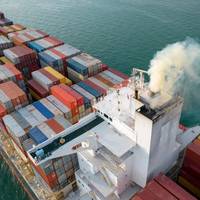
Countries on Friday adopted a revised greenhouse gas (GHG) strategy for shipping that sets a net zero emissions target "by or around 2050", which was viewed by environmental groups as falling short of what was needed. After days of discussion in London at U.N. shipping agency the International Maritime Organization’s (IMO) headquarters, member countries agreed to reach net zero "by or around, i.e., close to 2050, taking into account different national circumstances". Countries…
IMO Adopts New Measures to Cut Ship Emissions
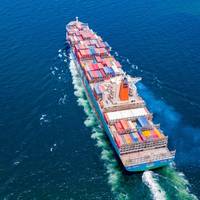
The U.N. shipping agency approved further measures on Thursday to boost the energy efficiency of commercial vessels although critics said the move fell short of what was needed to cut the industry's carbon footprint.The International Maritime Organization (IMO) formally adopted the rules to reduce the carbon intensity of existing ships after member states reached agreement on the plans at a virtual meeting this week.The measures add to already adopted energy efficiency regulations…
IMO Approves Extra Steps to Curb Shipping Emissions

The United Nations shipping agency on Tuesday approved measures to boost energy efficiency in vessels as part of efforts to reduce the industry's carbon footprint, a UN spokeswoman said.Countries approved the additional regulations to reduce the carbon intensity of commercial ships at this week's virtual Marine Environment Protection Committee (MEPC) session of the International Maritime Organization (IMO).Green groups opposed the approval, saying it would allow the shipping sector's share of emissions to keep rising over the next decade…
Massive Benefits in Reducing Ship Speeds
Cutting the speed of ships has huge benefits for humans, nature and the climate, according to a new report, a new report published by Seas at Risk and Transport & Environment (T&E) has highlighted.A 20% reduction would cut greenhouse gases but also curb pollutants that damage human health such as black carbon and nitrogen oxides, according to the two Brussels-based environmental NGOs."The large positive effect that reduced speeds can have on greenhouse gas (GHG) emissions is well known. What has received less attention is the positive effect such a change in speeds would have on nature and human health," said the report.The report describes how a modest 20% reduction in ship speed would reduce underwater noise pollution by 66%…
CSC Welcomes Commitment to Decarbonise Shipping
The commitment by governments to require international shipping to decarbonise and at least halve its greenhouse gas emissions by 2050 is a welcome and potentially game changing development, the Clean Shipping Coalition (CSC) has said. But the lack of any clear plan of action to deliver the emissions reductions, including urgently needed short-term measures, is a major concern, according to the group of NGOs with observer status at the UN’s International Maritime Organisation (IMO). After two weeks of difficult talks, countries attending the IMO meeting in London agreed to require the shipping sector to reduce its emissions by “at least 50% by 2050 compared to 2008”. This falls short of the 70-100% cut by 2050 that is needed to align shipping with the goals of the Paris agreement.
Fast, Quick Action Needed to Meet Paris Climate Goals: CAN
The International Maritime Organisation (IMO) has agreed on an initial strategy to decarbonise international shipping and reduce emissions from ships by at least 50% by 2050. While this agreement falls short of the 70 to 100% reductions by 2050 that the Pacific Islands, the EU and others were calling for ahead of the meeting, it keeps a window open to meet the Paris climate goals and is undeniably a game changer for the shipping sector. This plan serves as a welcome first step to phase out emissions from the sector, but the IMO must now build on the agreed minimum target of 50% reductions in subsequent reviews of the strategy to comply with its fair share of emissions under the Paris Agreement.
71% of New Box Ships Exceed IMO’s 2025 EEDI -Study
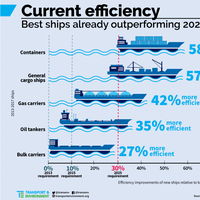
A new study has revealed that nearly three-quarters (71 percent) of all new containerships, which emit around a quarter of global ship CO2 emissions, are already in compliance with the post-2025 requirements of the International Maritime Organization’s (IMO) Energy Efficiency Design Index (EEDI). The study, based on analysis of the IMO’s own data and conducted by Transport & Environment (T&E), a founding member of the Clean Shipping Coalition (CSC), also found that the best 10 percent of new containerships are already almost twice as efficient as the requirement for 10 years time.
IMO Edges Towards Decarbonisation Objective
The UN's shipping body has settled on the main elements of an interim strategy aiming to decarbonise the sector, said a press release from Seas at Risk. Over 170 countries meeting at the International Maritime Organisation in London had some substantive discussion on objectives and ways to decarbonise shipping resulting in a 7-step outline that now needs to be developed into an interim plan due in 2018. One proposal calling for the shipping sector to adopt climate targets in line with the Paris Agreement and decarbonise by the second half of the century gained overwhelming expressions of support but failed to reach a consensus. The meeting saw China and India voice strong support for alternative low carbon fuels…
The Efficiency of New Ships is Falling: CE Delft Study

Recent improvements in the design efficiency of new ships went into reverse last year, a new independent study has found. According to the CE Delft study the average design efficiency of new bulk carriers, oil tankers and gas carriers was worse in 2016 than in 2015. The share of new ships complying with future efficiency standards also decreased in 2016. The design efficiency of containerships and general cargo ships appears to be stagnating after a period of improvement. The…
Experts Say Shipping Emissions Must Peak Soon to Achieve Paris Goals
International shipping and aviation will have to cap their greenhouse gas emissions (GHG) soon for the world to meet the ambitious goals laid down in the Paris Climate Change Agreement, participants at a side event at the Bonn climate change conference heard today. Emissions of carbon dioxide from aviation and shipping are growing at a combined rate of 3-5 percent annually. Efforts by the United Nations bodies overseeing these sectors to agree and adopt strategies to address climate change have moved forward but critical action areas remain to be fully addressed, panelists in the session said. There is “recognition that all countries need to tackle emissions from international transport,” said Martin Cames, Head of Energy and Climate at Öko-Institut. “Setting a target is key . . .
Study: Ship Efficiency Standards Too Weak to Drive Improvements
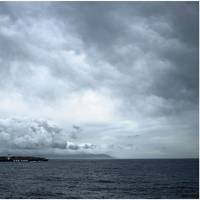
Shipping’s only legally binding climate measure is not stimulating the uptake of new technologies or driving efficiency improvements, according to a new independent study. Since 2013 newly-built ships subject to the International Maritime Organization’s (IMO) design fuel efficiency standard – known as the EEDI – have performed much the same as those not covered, the report for NGOs Seas At Risk (SAR) and Transport & Environment (T&E) finds. According to the study, at least two-thirds of containerships…
Excluding Shipping Emissions from COP Deal Makes 2°C Limit Close to Impossible
The dropping of international aviation and shipping emissions from the draft Paris climate agreement published this afternoon has fatally undermined the prospects of keeping global warming below 2°C, green NGOs Seas At Risk and Transport & Environment (T&E) have said. As their emissions uniquely fall outside national reduction targets, they require an explicit reference in the agreement. If treated as countries, global aviation and shipping would both make the list of top 10 emitters. In recent years their emissions have grown twice as fast as the those of the global economy – an 80% rise in CO2 output from aviation and shipping between 1990 and 2010, versus 40% growth in CO2 emissions from global economic activity – and they are projected to grow by up to 270% in 2050.
CSC Calls for Shipping Industry Emissions Reduction Target
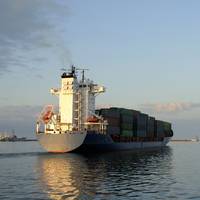
The Clean Shipping Coalition (CSC) is calling on ship owners and stakeholders gathering in Brussels for European Shipping Week to support an industry carbon emissions reduction target. The CSC, the global NGO coalition campaigning for cleaner shipping, said in a press release that as the only remaining major economic sphere yet to tackle its carbon emissions, shipping must act urgently to do their part to keep the global temperature increase below 2 degrees. Last year’s third…
IMO Urged to Provide Access to Efficiency Data

Shipping Fuel Transparency Will Lower Emissions and Cut Costs. NGOs call on shipping industry regulator to drive down costs, trigger improved fuel efficiency and reduce ship GHG emissions through efficiency data transparency. Transport & Environment, Seas at Risk and Carbon War Room are urging the International Maritime Organisation (IMO) not to withhold data on ship efficiency and fuel consumption. The call for action follows moves by some industry groups to undermine initiatives…
Study: Big Savings from Emissions Monitoring
Ship owners could save up to €9m with advanced emissions monitoring. Advanced emissions monitoring of large ships calling at EU ports could help save owners and operators of large ships up to €9 million/year, according to a new study published by sustainable transport group T&E. These savings would come from lower operational costs of using automated systems such as fuel flow meters or continuous emissions monitoring, which are already used by many of the world’s largest shipping companies. The cost savings arise from the electronic collection and reporting of data, which doesn’t require man-hours, as well as the accuracy and verifiability of the data, which significantly reduces verification costs by third parties.
NGO's Condemn IMO Environmental Implementation Delays
The International Maritime Organisation (IMO) today decided to postpone the entry into force of nitrogen oxide (NOx) emissions limits for ship engines from 2016 to 2021. Environmental NGOs Transport & Environment (T&E) and Seas at Risk, founding members of the IMO observer organisation Clean Shipping Coalition, condemn IMO’s decision and now call on the EU to adopt its own NOx limits for cleaner air. The decision taken at a meeting in London of the IMO working group reviewing MARPOL Annex VI [1], adopted in 2008, delays the introduction of stricter NOx emissions limits for engines of ships built from 2016 when sailing in so-called ‘NOx Emissions Control Areas’. Currently the North American coastline is such an area, and the Baltic Sea might be designated to be one.





